Calculating total and load capacities varying seating configurations
Calculate the available load capacity as shown in the following examples:
Example 1A
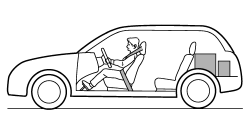
Vehicle capacity weight of the vehicle is 800 lbs (363 kg), which is indicated on the vehicle placard with the statement “The combined weight of occupants and cargo should never exceed 363 kg or 800 lbs”.
For example, if the vehicle has one occupant weighing 154 lbs (70 kg) plus cargo weighing 551 lbs (250 kg).
1. Calculate the total weight.

2. Calculate the available load capacity by subtracting the total weight from the vehicle capacity weight of 800 lbs (363 kg).
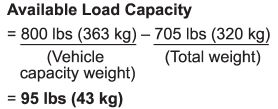
3. The result of step 2 shows that a further 95 lbs (43 kg) of cargo can be carried.
Example 1B
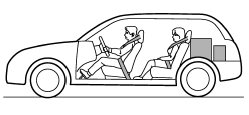
For example, if a person weighing 176 lbs (80 kg) now enters the same vehicle (bringing the number of occupants to two), the calculations are as follows:
1. Calculate the total weight.
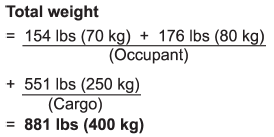
2. Calculate the available load capacity.
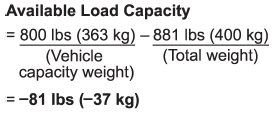
3. The total weight now exceeds the capacity weight by 81 lbs (37 kg), so the cargo weight must be reduced by 81 lbs (37 kg) or more.
Example 2A

Vehicle capacity weight of the vehicle is 800 lbs (363 kg), which is indicated on the vehicle placard with the statement “The combined weight of occupants and cargo should never exceed 363 kg or 800 lbs”.
For example, the vehicle has one occupant weighing 165 lbs (75 kg) plus cargo weighing 265 lbs (120 kg). In addition, the vehicle is fitted with a trailer hitch weighing 22 lbs (10 kg), to which is attached a trailer weighing 1,764 lbs (800 kg). 10% of the trailer weight is applied to the trailer tongue (i.e. Tongue load = 176 lbs (80 kg)).
1. Calculate the total weight.
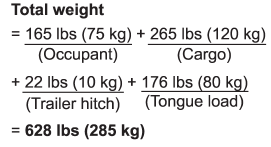
2. Calculate the available load capacity.
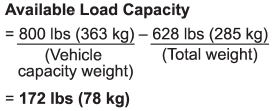
3. The result of step 2 shows that a further 172 lbs (78 kg) of cargo can be carried.
Example 2B

For example, if a person weighing 143 lbs (65 kg) and a child weighing 40 lbs (18 kg) now enter the same vehicle (bringing the number of occupants to three), and a child restraint system weighing 11 lbs (5 kg) is installed in the vehicle for the child to use, the calculations are as follows:
1. Calculate the total weight.
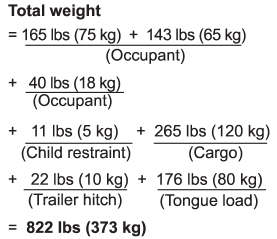
2. Calculate the available load capacity.
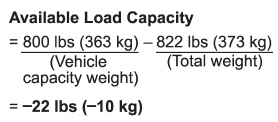
3. The total weight now exceeds the capacity weight by 22 lbs (10 kg), so the cargo weight must be reduced by 22 lbs (10 kg) or more.
See also:
Compass zone adjustment
Compass calibration zones
1. Refer to the “Compass calibration zones” map shown above to verify that the
compass zone setting is correct for your geographical location.
2. Press and hold the com ...
Outback 2.5 XT Limited
In terms of regular old driving, my Outback XT test car's drivetrain offers
spirited acceleration, though there's a lag from a standing start — even if you
floor it. By playing with the SI-Drive f ...
Driving range on remaining fuel
1) U.S.-spec. models
2) Except U.S.-spec. models
The driving range indicates the distance that can be driven taking into account
the amount of fuel remaining in the tank and the average rate of ...


